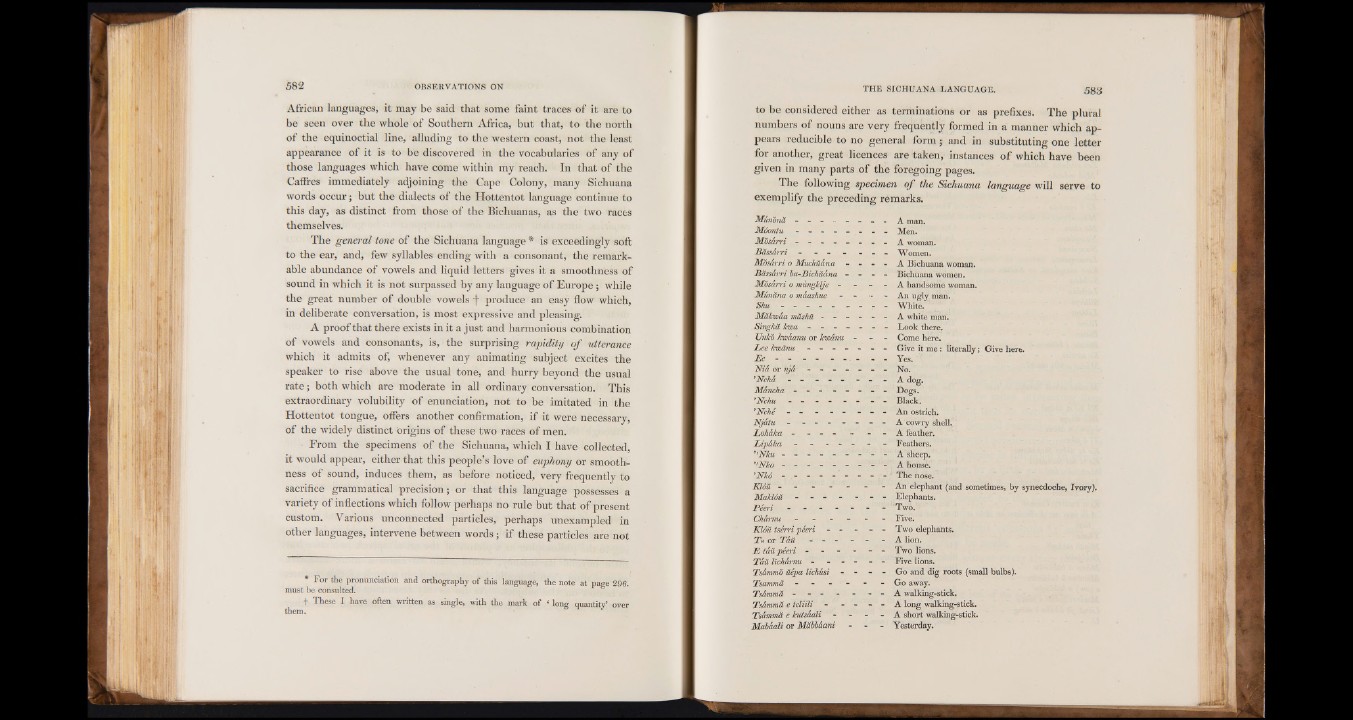
African languages, it may be said that some faint traces of it are to
be seen over the whole of Southern Africa, but that, to the north
of the equinoctial line, alluding to the western coast, not the least
appearance of it is to be discovered in the vocabularies of any of
those languages which have come within my reach. In that of the
Caffres immediately adjoining the Cape Colony, many Sichuana
words occur; but the dialects of the Hottentot language continue to
this day, as distinct from those of the Bichuanas, as the two races
themselves.
The general tone of the Sichuana language * is exceedingly soft
to the ear, and, few syllables ending with a consonant, the remarkable
abundance of vowels and liquid letters gives it a smoothness of
sound in which it is not surpassed by any language of Europe; while
the great number of double vowels j- produce an easy flow which,
in deliberate conversation, is most expressive and pleasing.
A proof that there exists in it a just and harmonious combination
of vowels and consonants, is, the surprising rapidity of utterance
which it admits of, whenever any animating subject excites the
speaker to rise above the usual tone, and hurry beyond the usual
rate; both which are moderate in all ordinary conversation. This
extraordinary volubility of enunciation, not to be imitated in the
Hottentot tongue, offers another confirmation, if it were necessary,
of the widely distinct brigins of these two races of men.
From the specimens of the Sichuana, which I have collected,
it would appear, either that this people’s love of euphony or smoothness
of sound, induces them, as before noticed, very frequently to
sacrifice grammatical precision; or that this language possesses a
variety of inflections which follow perhaps no rule but that of present
custom. Various unconnected particles, perhaps unexampled in
other languages, intervene between words; if these particles are not
* For the pronunciation and orthography of this language, must be consulted. the note at page 296.
themf. These I have often written as single, with the mark of f lone quantitJy’ over
to be considered either as terminations or as prefixes. The plural
numbers of nouns are very frequently formed in a manner which appears
reducible to no general form; and in substituting one letter
for another, great licences are taken, instances of which have been
given in many parts of the foregoing pages.
The following specimen of the Sichuana language will serve to
exemplify the preceding remarks.
Mdnbnd - - - - - - - - A man.
Mdontu - - - - - - - - Men.
M bsdm - - - - - - - - A woman.
Bdssdrri - - - - - - Women.
Mbsdrri o MuchUdna - - - - - A Bichuana woman.
Bdssdrri ba-Bichiiana - - - - Bichuana women.
Mbsdrri o mungJclje - A handsome woman.
Miindna o mdashue - An ugly. man.
Shu - - - - - - - - - White.
Mdtonda mdshu - - - - - - A white man.
, Singled kwa - - - - - - - Look there.
XJnkb Imdanu or hwdnu - - - Come here.
Lee kwdnu - - - - - - - Give it me: literally; Give here.
Ee - - - - - - . - - - Yes.
Nid or hjd - - - '- - - - No.
*Nchd - - - . - - - - - A dog.
Mdncha . - - - - - - - Dogs.
’Nchu - - - - - - - - Black.
’NchS - - - - - - - - An ostrich.
Nj&tu - - - - - - - - A cowry shell.,
Lohdka - - - - » - - A feather.
Lipdka - - - - - - - Feathers.
,'N ku - - - - - ‘ - ’ - - A sheep.
’'Nko - - - - - - - - - A House.
’Nkb - - - - - - ' The nose.
KISH - - - - - - - An elephant (and sometimes, by synecdoche. Ivory).
Maklbti - - - - - - - Elephants.
Peeri - - - - - - Two.
Chdmu - - - - - - Five.
Kidd tsdrri pieri - - - - - Two elephants.
7b or Tdit - - - - - - A lion.
E tddpSeri - - - - - Two lions.
Tdd Rchdmu - - - - - - Five lions.
Tsdmmb uepa lichiisi - - - - Go and dig roots (small bulbs).
Tsammd - - - - - - Go away.
Tsdmmd - - - - - - - A walking-stick,
Tsdmmd e teliili - - - - - A long walking-stick.
Tsdmmd e Jcutsdali - - - - A short walking-stick.
Mabdali or Mdbbdani - - - Yesterday.